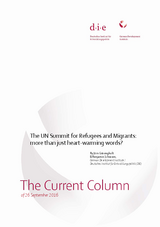The Current Column
The UN Summit for Refugees and Migrants: more than just heart-warming words?
Grävingholt, Jörn / Benjamin SchravenThe Current Column (2016)
Bonn: German Development Institute / Deutsches Institut für Entwicklungspolitik (DIE) (The Current Column of 26 September 2016)
Bonn, 26 September 2016. There are over 65 million refugees and internally displaced persons worldwide. This was the backdrop against which the UN held a summit last Monday addressing major refugee and migrant flows. In the New York Declaration for Refugees and Migrants, the UN member states have committed themselves to doing more to support states which are taking in a particularly high number of refugees, to better protecting the rights of refugees and migrants, and to improving integration measures. And yet it is quite apparent that this commitment is non-legally binding. Consequently, a considerable number of critics view the meeting as little more than a summit of heat-warming words and declarations of intent that will have no impact whatsoever. Nonetheless, the summit also marks the starting point of two processes, one on displacement and one on migration, which are expected to give rise to two corresponding agreements in the next two years. It is extremely important that these agreements form a real international framework for tackling refugee crises more effectively and fairly, and for making international migration more equitable. At present, there are no global regulations for managing migration, while the regulations for refugees are not working. The Geneva Refugee Convention is one of the United Nations’ oldest accomplishments. Given the millions of refugees and displaced persons in Europe at the time, the international community agreed in 1951 on binding rules for dealing with individuals displaced for political reasons. But even back then, the global refugee protection mechanism that was established was unable to respond to the major people movements resulting from war and conflict, such as that which came in the wake of the Partition of India in 1947. The major increase in refugee numbers in recent years has made these weaknesses particularly apparent. The burden of taking in refugees is very inequitably distributed. A handful of mainly poor countries, such as Jordan, Pakistan and Ethiopia, have taken in more than half of the 21 million or so international refugees worldwide. Most of these individuals have been living outside their countries of origin for years. The situation is made all the more bitter by the fact that the vast majority of states reject lasting solutions which would significantly improve the living situation and prospects of refugees. Refugees are often denied the opportunity of legally integrating into society. Resettlement efforts are negligible: fewer than 5,000 of the 160,000 refugees set to be resettled within the EU in 2015 to relieve pressure on Italy and Greece in particular have actually been redistributed. Additionally, the support provided to refugees in the main host countries is characterised by chronic resource scarcity, strong competition between UN organisations, a lack of involvement of local organisations, and inadequate links with development cooperation measures. And the situation is even more difficult for the 180 million or so international migrants who have not fled their countries as refugees to escape threats or violence, but who rather are looking for fresh prospects for themselves or working to create prospects for their relatives back home, for example, by means of remittances. Unlike the refugee protection mechanism and indeed many other international issues such as the global climate, world trade and international mail transport, there is no global framework agreement for managing migration between states. Global migration governance is a patchwork of regional accords and the mandates of various international organisations which only partially touch upon the issue of migration. Even though perceptions of migration have changed over the past 20 years and the issue is now viewed as essentially positive and as an opportunity for development, many international migrants live under precarious social, economic and legal conditions. Past attempts to establish minimum legal requirements constantly failed in the face of opposition from industrialised nations in particular. The situation is being further intensified by the increase in xenophobia and racism observed recently in many countries. But some small initial steps are being taken towards improving global governance of displacement and migration. The United Nations admitted the International Organization for Migration (IOM), which is the central body for managing migratory movements between states, to its system at the New York summit. According to the US, the international community has also provided USD 4.5 billion more in refugee assistance this year than it did in 2015. This and other small steps will be necessary to pave the way for far-reaching international accords by 2018. This is likely to require a pragmatic approach if further progress is to be achieved in line with the guiding principles of shared international responsibility. Some states, such as Australia, Hungary and Poland, are hardly likely to give up their stance of opposing the admission of refugees for the time being. But if these countries could at least be required to make an adequate and regular financial contribution to refugee assistance efforts, this would represent another step forward.



